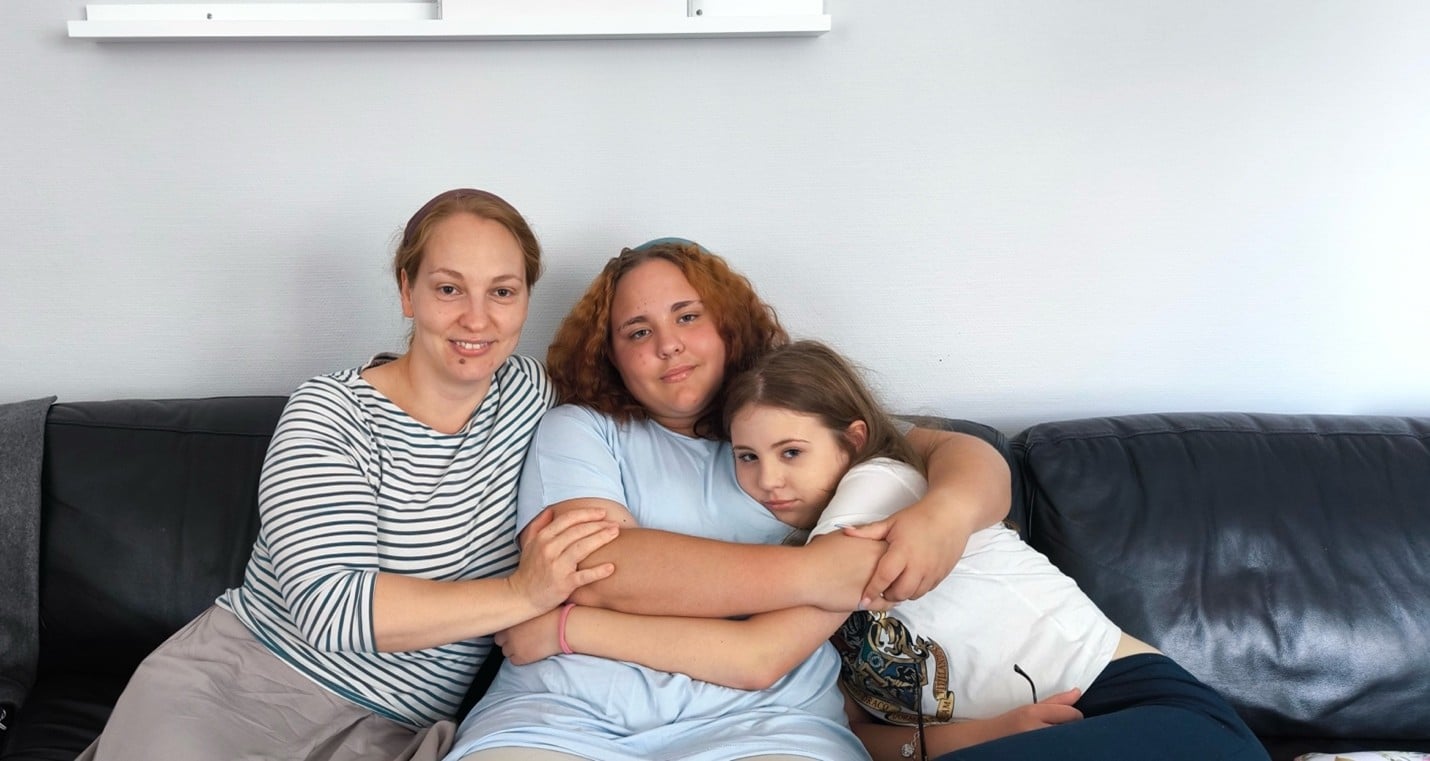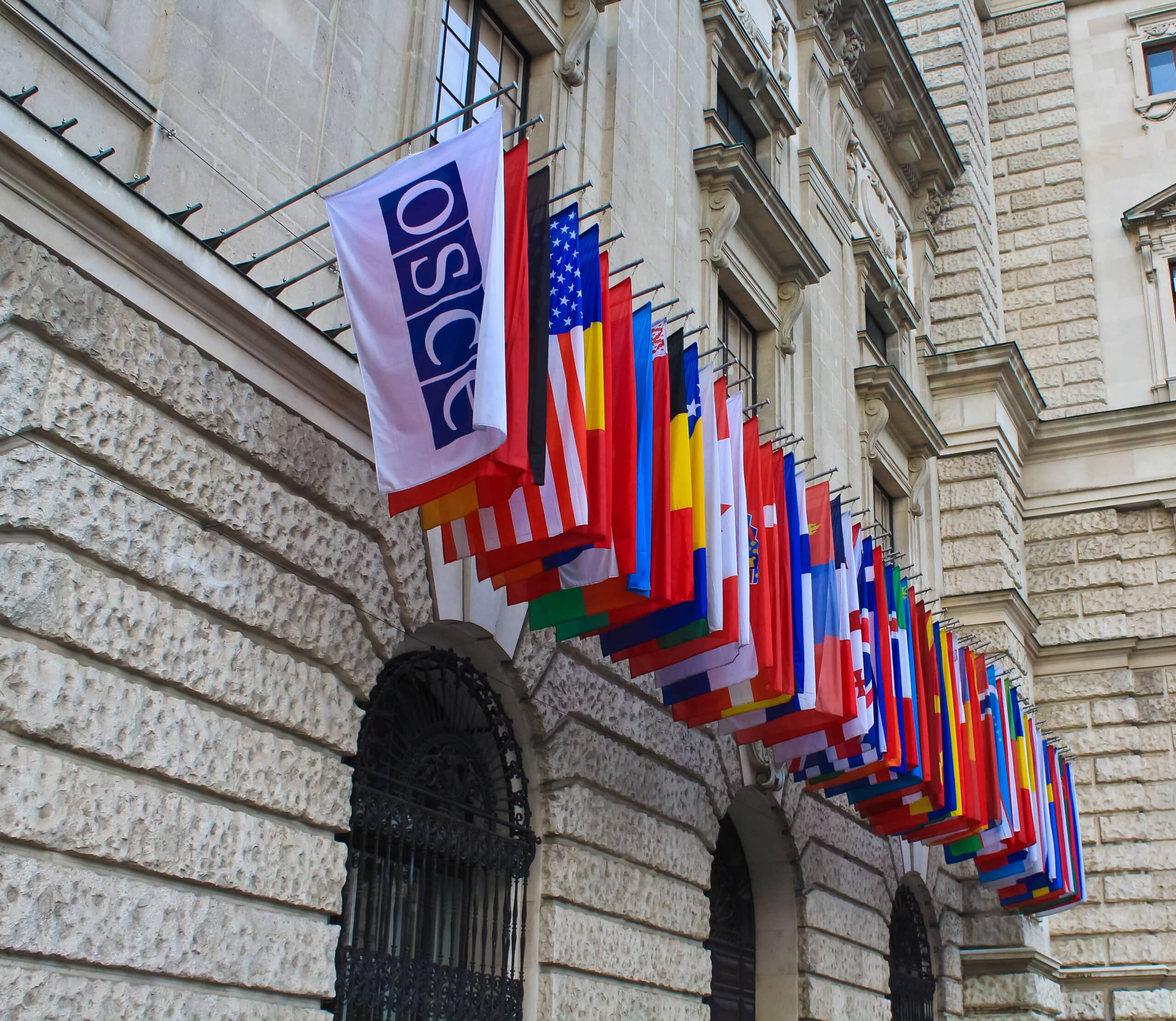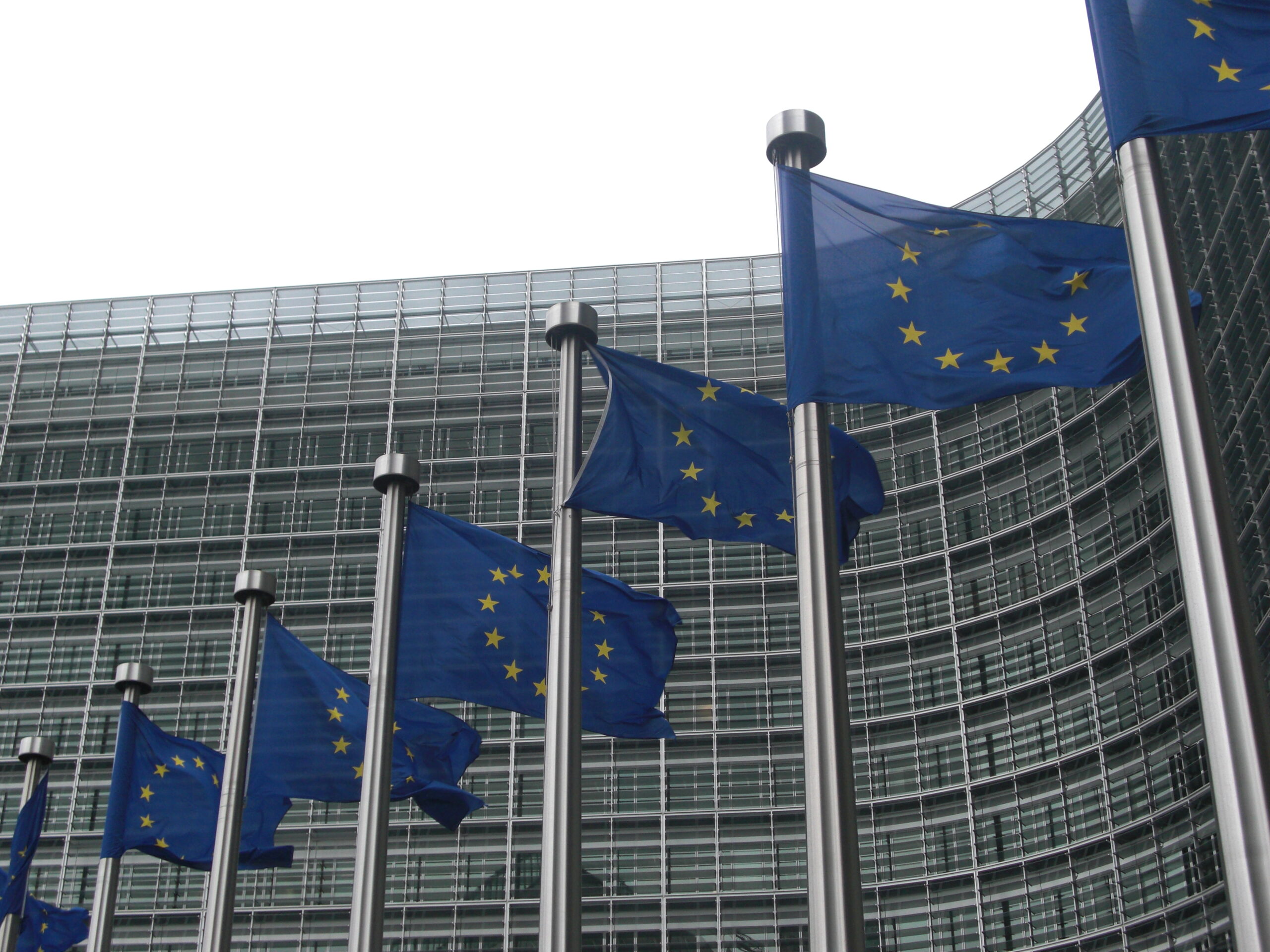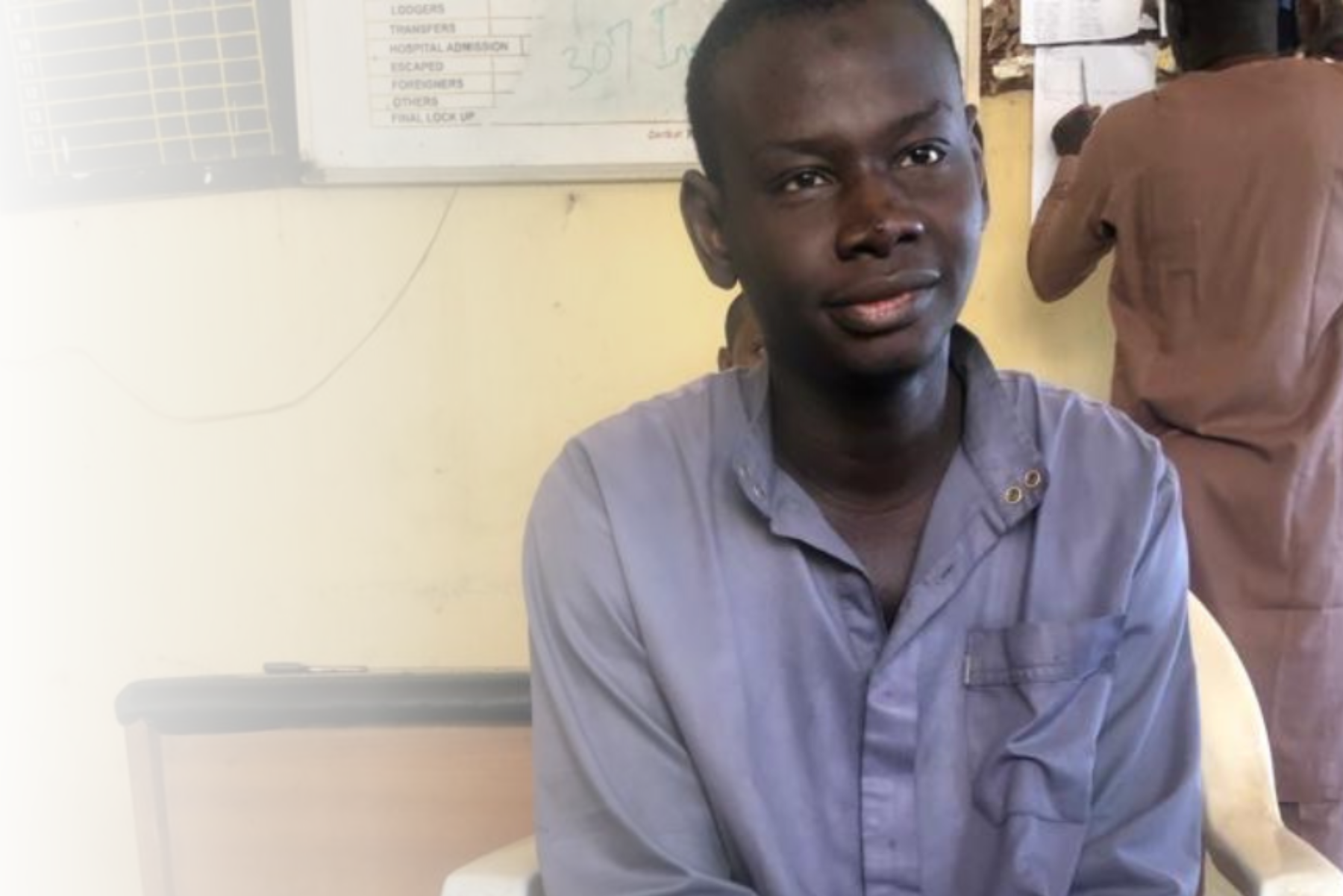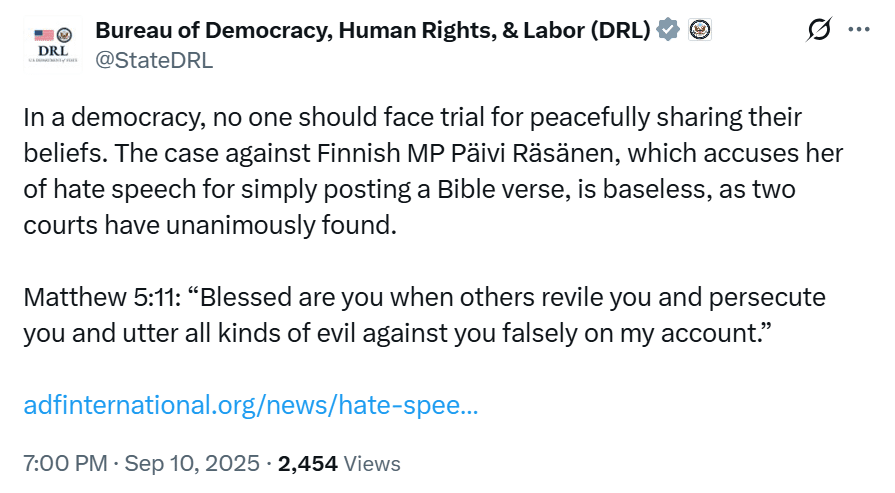Räsänen will be available for questions at an online press conference hosted by ADF International on Oct 30th at 16:00 CET (11:00 EDT)
Continue reading“They Took Our Children”: Christian Parents Bring Sweden Before European Court of Human Rights After Almost 3 Years’ Separation from Daughters
Two daughters of a Christian couple in Sweden were seized by the state after their older daughter made a false report at school over her parents’ refusal to give her a phone and allow makeup, prompting allegations of “religious extremism,” even though she promptly retracted.
Continue readingTürkiye Labels Christians as ‘National Security Threats’ to Justify Mass Expulsions
Speaking today at the OSCE Warsaw Human Dimension Conference, Lidia Rieder, Legal Officer for ADF International warned that the government of Türkiye is systematically targeting Christians under the guise of “national security,” expelling hundreds of foreign believers and leaving local congregations without spiritual leadership.
Continue readingFollowing Prime Minister’s Rejection, Egyptian Christians Petition Government in Case to Recognize Easter Sunday as a Public Holiday
First hearing held in case to officially recognize Easter; presents new opportunity for Egypt to advance religious freedom protections, as petitioners seek to end requirement for millions of Christians to work or attend school on Easter Sunday.
ADF International supports the petition to protect Egyptian Christians’ right to worship on Easter in an ancient cradle of Christianity.

CAIRO — 13 OCTOBER. Over the weekend, Egypt’s Administrative Court heard an appeal challenging the Prime Minister’s denial of a petition calling for Easter Sunday to be recognized as an official public holiday. The petition, submitted by lawyers and citizens from diverse religious backgrounds and supported by ADF International, urges the government to designate Easter—one of the most important and widely celebrated days on the Christian calendar—as a public holiday. The case will now move forward to the State Commissioners Authority, who will consider the matter on January 17, 2026.
Egypt has one of the oldest Christian communities in the world, and Christians continue to make up over 10% of the country’s population. Despite the estimated 10 million Christians living in Egypt, Easter Sunday is not currently recognized as a public holiday. Because Sunday is a regular working day in the country, rather than part of the weekend, many Christians are forced to attend work or school on Easter Sunday.
“This petition represents an important opportunity to advance the right of Christians to freely practice their faith in Egypt. For millions of Egyptian Christians, recognizing Easter as a public holiday would mean being able to fully observe one of the most sacred days of their faith without having to choose between work or school and their religious practices."
- Kelsey Zorzi, Director of Advocacy for Global Religious Freedom at ADF International
“For years, I’ve been forced to work on Easter Sunday. I’ve been denied the ability to attend church and celebrate with my family,” said one government employee at Egypt’s Ministry of Higher Education.
Even when accommodations are requested, they are often denied. As one Christian lawyer in Cairo explained, “I was required to appear in court on Easter Sunday. The judge refused to reschedule. I missed church and family traditions.”
Other religious holidays, including Orthodox Christmas and Muslim celebrations, are already officially recognized by the Egyptian government. The lack of recognition of Easter forces Christians to choose between observing their faith and fulfilling their professional or academic duties.
“This petition represents an important opportunity to advance the right of Christians to freely practice their faith in Egypt,” said Kelsey Zorzi, Director of Global Religious Freedom for ADF International. “For millions of Egyptian Christians, recognizing Easter as a public holiday would mean being able to fully observe one of the most sacred days of their faith without having to choose between work or school and their religious practices. It’s a meaningful step toward ensuring their rights are respected.”
The petition draws on both Egyptian constitutional provisions, such as the guarantees of religious freedom and equality under Articles 53 and 64, and Egypt’s obligations under international human rights treaties, including the International Covenant on Civil and Political Rights and the International Labour Organization’s Convention No. 111, which prohibits religious discrimination in employment. The historical precedent for recognizing Easter as a public holiday in Egypt dates back to the monarchy, which formally acknowledged and observed it as a holy day. Petitioners note that several other countries in the Middle East already recognize Easter, and that doing so in Egypt would mark an important step forward for religious freedom in the region.
“Recognizing Easter as a public holiday is essential because it removes a significant barrier for millions of Egyptian Christians who currently must choose between their faith and their work or education,” said Haytham Ereifej, attorney and representative of ADF International in the Middle East. “This change upholds their constitutional and international rights, ensuring equal treatment and respect for religious freedom across Egypt.”
ADF International is supporting this effort and will continue to advocate for the protection of religious freedom in Egypt and around the world.
Background
ADF International is committed to promoting religious freedom for Christians and other religious minorities in Egypt. Through engagement with local partners and international bodies, ADF International has consistently advocated for the rights of all Egyptians to freely choose, speak about, and live out their faith. Such rights are consistent with Egypt’s constitution, which explicitly prohibits discrimination on the basis of religion, as well as its commitments under numerous international treaties.
The petition to recognize Easter Sunday as a national holiday reflects a broader grassroots effort, supported by ADF International, to help build a culture of genuine religious equality in Egypt, where every citizen is free to live out their faith without penalty or restriction.
One hundred experts write to European Commission warning EU legislation risks censoring global speech
- Letter calls on Commission to consult free speech experts as part of review into censorial Digital Services Act (DSA)
- Letter from free speech experts, which was coordinated by ADF International, comes after US Ambassador to EU and Google recently expressed concerns that DSA risks censoring American online speech
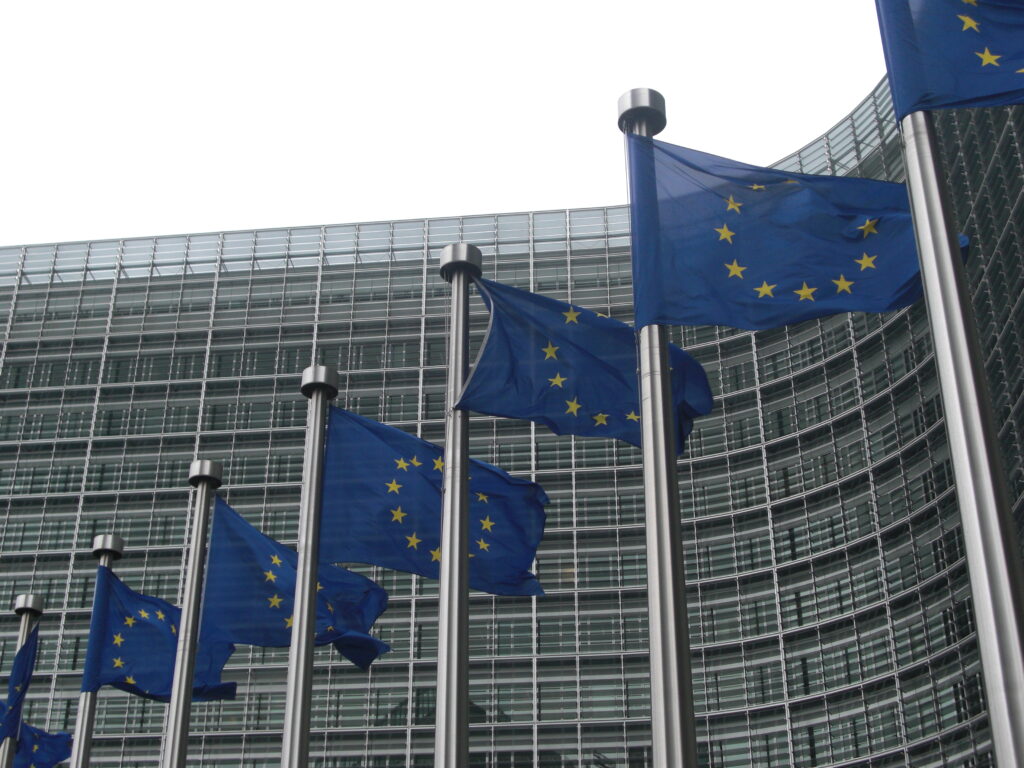
BRUSSELS (9 October 2025) – More than 100 free speech experts from around the world today wrote to the European Commission warning that an EU law risks censoring global speech online.
In a letter to the European Commission, the 113 experts, including a former VP of Yahoo Europe, a former US Senator, and politicians, academics, lawyers and journalists from around the globe, called on the Commission to consult free speech experts as part of its review into the EU’s Digital Services Act (DSA), which will take place by 17 November.
The letter, which was coordinated by free speech legal advocacy organisation ADF International, states: “[The DSA] constructs a pan-European censorship infrastructure with loosely defined boundaries and the potential to suppress legitimate democratic discourse…
“The wide definition of illegal content allows the most speech-restrictive provisions of one single EU country to be imposed as a standard across the entire Union, and potentially worldwide, effectively importing the lowest common denominator of expression.”
The letter added: “The broad definition of ‘illegal content’ in the DSA, combined with existing jurisprudence of the Court of Justice of the European Union (CJEU) opens the door to worldwide takedowns.”
Signatories include ADF International Executive Director Paul Coleman, President, CEO, and Chief Counsel of Alliance Defending Freedom Kristen Waggoner, former Vice President of Yahoo Europe Jean-Marc Potdevin, former US Senator and former US Ambassador-At-Large for International Religious Freedom Sam Brownback, Founder and General Secretary of the Free Speech Union Toby Young, former President of the American Civil Liberties Union Nadine Strossen, award-winning journalist and author Michael Shellenberger and Research Fellow at the Hoover Institution Ayaan Hirsi Ali.
Cross-party Members of the European Parliament (MEPs) also signed the letter, including ECR MEP Stephen Bartulica, EPP MEP Branko Grims, and Patriots MEP Virginie Joron, as well as McCormick Professor of Jurisprudence at Princeton University Robert P George, American philosopher and author Peter Boghossian, child protection advocate Chris Elston aka Billboard Chris and other experts from the UK, Europe, Latin America and the United States.
Read the full letter, see the full list of signatories and sign the public version of the letter here.
Opaque review process into DSA
The letter expresses concern over the European Commission’s opaque review process into the DSA and calls on the Commission to: “Conduct a comprehensive and inclusive consultation with independent experts in freedom of expression, constitutional law, and digital rights, ahead of the November review, inviting public comments.
“Publicly disclose the list of NGOs, civil society actors, and partner entities engaged in the review process, including the criteria and methodology used for their selection.
“Ensure that the review includes a rigorous legal analysis of the DSA’s compatibility with fundamental rights protections, especially under Article 11 of the Charter of Fundamental Rights of the EU, Article 10 of the ECHR, and Article 19 of the ICCPR.”
Concerns from US Ambassador to the EU
The experts’ letter to the European Commission comes after the US Ambassador to the EU Andrew Puzder last week expressed concern that the DSA risks censoring American citizens, and follows Google warning the DSA threatens American speech.
Ambassador Puzder last week said: “No President of either party, and I can tell you President Trump in particular, is going to tolerate a foreign government restricting the First Amendment fundamental free speech, free expression rights of American citizens, to an extent that the United States government can’t even regulate those rights.
“So we need to come to an understanding as to what’s happening with the Digital Services Act.”
Ambassador Puzder has also reportedly said the United States will make formal submissions under the European Commission’s review of its digital legislation.
The letter’s warning about the threat of global DSA censorship reinforces Ambassador Puzder’s and Google’s concerns.
Dr Adina Portaru, Brussels-based Senior Counsel, Europe for ADF International said:
“The European Commission claims the DSA will not censor speech and will merely create a safer online environment. In this letter, one hundred free speech experts vehemently disagree.
“The US Ambassador to the EU and Google recently expressed concern that the DSA threatens American online speech. This letter from experts reinforces these concerns and warns that the legislation threatens to impose an online censorship regime not just in the EU, but across the whole world.
“The Commission must urgently engage with these concerns in their review of the DSA, and act to ensure freedom of expression is protected online.”
French MEP and signatory of the letter Virginie Joron said:
“The French digital regulator ARCOM told me they believe the DSA allows them to censor any post anywhere in the world using the DSA. That means even an American citizen posting in Alabama could potentially have their online post taken down, even if the publication would be legal in the US.
“This already happened in 2023 after the Annecy terror attack in a playground in the South of France where a migrant from Syria stabbed four babies and toddlers. A reaction from a US citizen was taken down, as described in the report from the US Congress.”
As well as warning about the possibility of global takedown orders under the DSA, the letter also quotes the US House Judiciary Committee in highlighting another way the EU legislation risks censoring global online speech: “Because many social media platforms generally maintain one set of content moderation policies that they apply globally, restrictive censorship laws like the DSA may set de facto global censorship standards.”
Read more about the DSA here.
Images for free use in print or online in relation to this story only
(From left to right: Dr Adina Portaru, Brussels-based Senior Counsel, Europe for ADF International; French MEP Virginie Joron)
UN Expert Calls to Globally Prohibit Surrogacy in Landmark Report
- Ahead of her report presentation to the UN General Assembly, UN Special Rapporteur on Violence Against Women and Girls, Reem Alsalem, condemns surrogacy at high-level UN event, stating the practice commodifies women and children.
- ADF International co-presents at event hosted by Italian government; applauds the call to prohibit the practice globally.
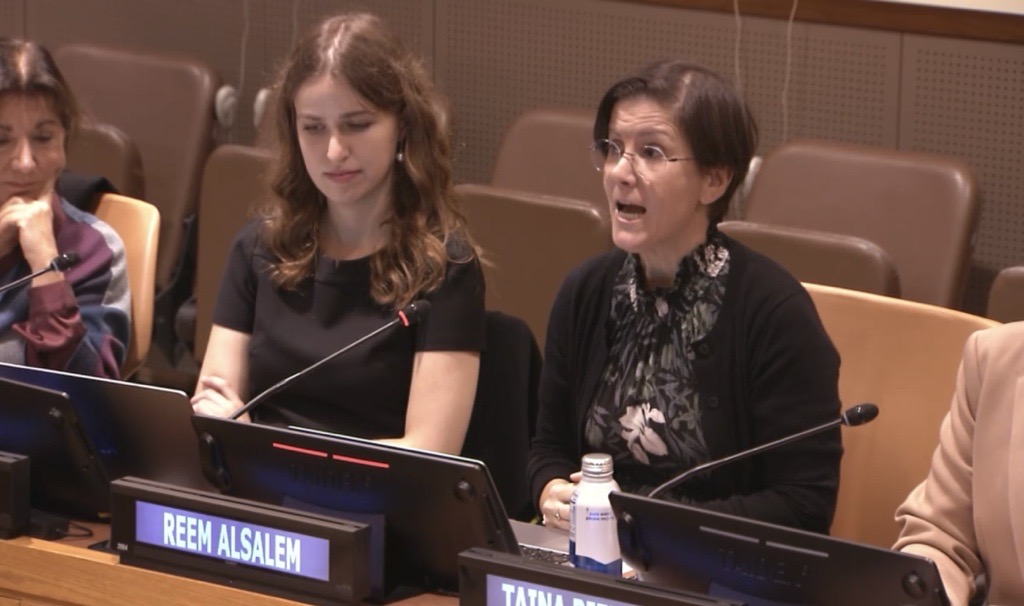
NEW YORK CITY (8 October 2025) – Today, the United Nations Special Rapporteur on Violence Against Women and Girls, Reem Alsalem, formally spoke out against the practice of surrogacy at a UN General Assembly event. She stated, “[Surrogacy] is clearly responsible for inflicting large-scale violence, abuse, and exploitation on women and children.” Alsalem is set to present her latest report on Oct. 10 before the UN General Assembly. In it, she calls for a global prohibition on all forms of surrogacy, warning that the practice is “characterized by exploitation and violence against women and children, including girls.”
The report calls on States to adopt a legally binding international instrument prohibiting all forms of surrogacy and urges immediate action to criminalize the commissioning of children and its facilitation by surrogacy agencies and clinics, ban its advertisement, protect women already engaged in surrogacy arrangements through legal support and psychosocial services, and ensure that children’s rights to identity, care, and protection are upheld.
“[Surrogacy] is clearly responsible for inflicting large-scale violence, abuse, and exploitation on women and children.”
- Reem Alsalem, UN Special Rapporteur on Violence Against Women and Girls
Hosted by the Government of Italy, the event comes amid growing international momentum to prohibit surrogacy. In 2024, Italy became the first country to prohibit surrogacy both within and outside its borders. Last month, Slovakia adopted a constitutional amendment prohibiting the practice.
“Surrogacy should not be prohibited only domestically, but it should also be addressed internationally,” said Eugenia Rocella, Italian Minister for Family, Natality, and Equal Opportunities. “The Italian Government is convinced that… existing international treaties on the protection of women and children’s rights should be updated to explicitly include surrogacy as a practice of undermining dignity and entailing exploitation.”
The report details how surrogacy intentionally separates children from their mothers, severing natural maternal bonds and undermining their rights to identity, care, and protection from violence. It also emphasizes that even “altruistic” surrogacy arrangements harm both women and children by treating human life as a product.
“An inherent concern in surrogacy lies in the contractual programming of separation between a woman and the child that she carries, which risks treating the child as a passive object of an agreement between adults or as a commodity,” the report states. ADF International, who participated in welcomes the report as a landmark moment for the global movement to end surrogacy. At the event ahead of the presentation, the legal organization highlighted the need for immediate action from states to prohibit surrogacy.
“Surrogacy rests on a system of violence that dehumanizes women and children alike. States need to develop a coordinated international response to end the grave human rights violations inherent in this practice,” said Giorgio Mazzoli, Director of UN Advocacy at ADF International. “We commend the Special Rapporteur for exposing the harms of this exploitative industry and urge governments around the world to united in ending surrogacy in all its forms at all levels, including through the adoption of a UN treaty ending the practice globally.”
The organization was among the promoters of a civil society letter in support of the Special Rapporteur’s report, signed by over 180 NGOs, further emphasizing the call on States to globally prohibit surrogacy.
Background
The UN expert report describes the global surrogacy industry as a rapidly growing market, valued at $14.4 billion in 2023 and projected to reach $96.6 billion by 2033. Despite its lucrative nature, the overwhelming majority of profits go to agencies and brokers, while surrogate mothers bear the brunt of serious physical, emotional, and financial risks.
Women undergoing surrogacy face increased rates of pregnancy complications, depression, and post-traumatic stress disorder. Many are subjected to coercion, exploitation, and invasive medical procedures, and even “altruistic” arrangements often involve separating children from their mothers, commodifying women’s reproductive capacities, and prioritizing the desires of adults over the rights of the child.
ADF International remains committed to protecting the dignity of human life and safeguarding women and children from exploitation. The organization advocates for legal protections to end surrogacy and prevent the commodification of human life.
Glasgow Grandmother arrested AGAIN for offering conversations in abortion “buffer zone”
- Christian grandmother arrested a second time; criminally charged for holding a sign reading “Coercion is a crime, here to talk, only if you want” within 200m of a hospital
- Rose Docherty, aged 75, left without chair for two hours in a police cell – despite having two hip replacements
GLASGOW (27 September 2025) – 75-year-old grandmother Rose Docherty has been arrested a second time and criminally charged for holding a sign within 200m of the Queen Elizabeth University Hospital, reading:
“Coercion is a crime, here to talk, only if you want.”
In Scotland, “buffer zones” are enforced within 200m of every hospital, forbidding harassment, intimidation, and “influencing” of anyone seeking to access abortion services.
“I should not be treated as a criminal for inviting people to chat with me – lending a listening ear."
- Rose Docherty
Despite only having stood silently offering consensual conversation and not having approached any individual, Docherty has been charged with breaching the “buffer zone.”
Reacting to her arrest, Rose Docherty said:
“Everybody has the right to engage in consensual conversation. I held my sign with love and compassion, inviting anyone who wants to chat, to do so – and stood peacefully, not approaching anyone.
“I should not be treated as a criminal for inviting people to chat with me – lending a listening ear. Conversation is not forbidden on the streets of Glasgow. And yet, this is the second time I have been arrested for doing just that.”
In August, Scottish authorities dropped their case against Docherty for holding the same sign in the same place after a global outcry against the 75-year-old grandmother’s arrest, including concerns raised in an online post by the U.S. State Department.
After her arrest this week, Docherty was held in custody for several hours. She was refused a chair to sit on in her cell, despite making it known that she had a double hip replacement.
Docherty has been charged and released on bail. Stringent bail conditions prevent her from attending an area marked out to be wider than the initial “buffer zone” area, in a move the legal team at ADF International call “disproportionate”.
Legal Counsel for ADF International, Lorcan Price commented:
“It’s deeply concerning that Scottish policing resources are being ploughed into arresting and prosecuting a peaceful grandmother offering to speak to people in public, rather than focusing on the problems caused by real crime in Glasgow.
“This is not a case about harassment, intimidation or violent protest – this is simply a grandmother, who held a sign offering to speak to anyone who would like to engage.”
The law’s architect, Gillian Mackay MSP, admitted on BBC Scotland earlier this year that the vague prohibitions in the buffer zones law could criminalise someone for praying visibly from a window in their home within the zone, “depending on who’s passing by the window.”
U.S. Vice President J.D. Vance highlighted this law as a particular matter for concern in his Munich Security Conference speech in February of this year.
Images for free use in print or online in relation to this story only
Pictured: Rose Docherty, Lorcan Price (ADF International)
Nigerian State Lawyer Threatens to Publicly Execute Young Man for Sending a Song on WhatsApp
After more than five years’ imprisonment, a first hearing for Yahaya Sharif-Aminu’s WhatsApp blasphemy case was held at the Nigerian Supreme Court; State lawyer declares “we will execute him publicly”
ADF International is supporting Yahaya in his fight for justice and the repeal of Nigeria’s blasphemy laws.
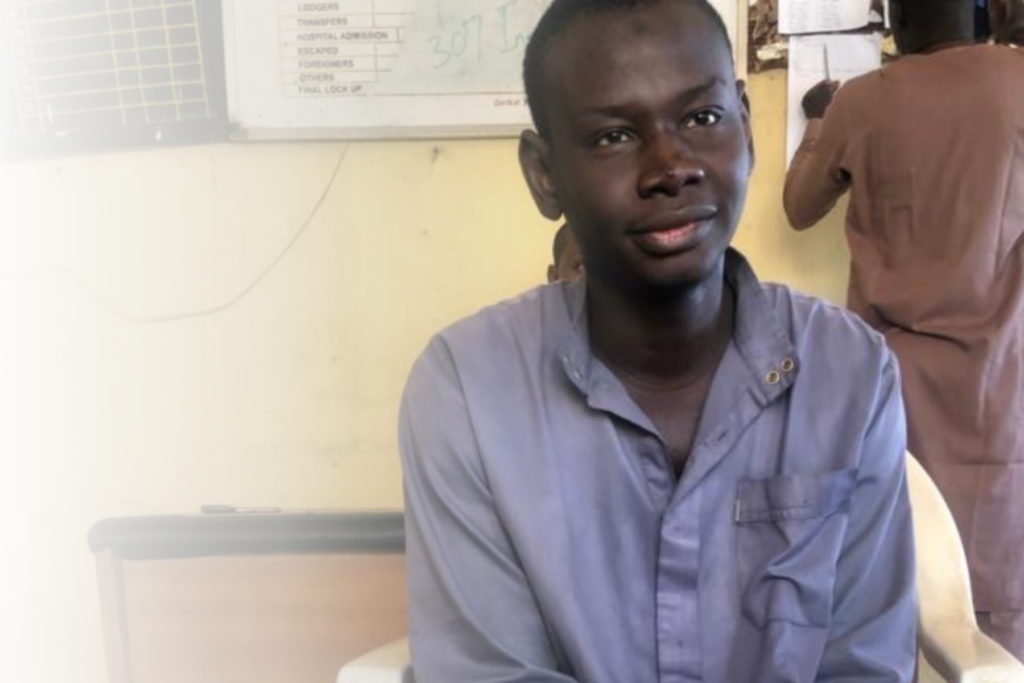
ABUJA (26 September 2025) – Yesterday, the Supreme Court of Nigeria held its first hearing in the case of Yahaya Sharif-Aminu, a young Sufi musician sentenced to death in 2020 in Kano State, Nigeria, for allegedly sharing song lyrics on WhatsApp deemed blasphemous. This marks the first step in his appeal before the country’s highest court, more than five years after his imprisonment. The Supreme Court permitted Sharif-Aminu’s appeal to move forward.
Directly following the hearing, Lamido Abba Sorondinki, counsel for the Kano State government, spoke explicitly about the state’s intention to publicly execute Sharif-Aminu, should the Supreme Court rule in Kano State’s favor: “This applicant made blasphemous statements against the Holy Prophet, which the government of Kano State will not condone. If the Supreme Court upholds the lower court’s decision, we will execute him publicly.” This chilling statement underscores the extreme severity of northern Nigeria’s blasphemy laws, which continue to threaten the lives of religious minorities and silence free expression.
“The Supreme Court of Nigeria has before it a matter of literal life or death. Absolutely no one should face the death penalty for peacefully sharing song lyrics. In a severe violation of his fundamental human rights, Yahaya has languished in prison for more than five years for a peaceful WhatsApp message"
- Sean Nelson, Legal Counsel for ADF International
“The Supreme Court of Nigeria has before it a matter of literal life or death. Absolutely no one should face the death penalty for peacefully sharing song lyrics. In a severe violation of his fundamental human rights, Yahaya has languished in prison for more than five years for a peaceful WhatsApp message,” said Sean Nelson, Legal Counsel for ADF International. “Yesterday’s Supreme Court hearing is the next step in earning justice for him and protecting his right to free expression and religious freedom, and in turn, that of every person in Nigeria. This case goes beyond one young man. It is about whether millions of Nigerians can live free from fear under unjust blasphemy laws.”
“For far too long, blasphemy laws have wrongfully been used to persecute and harm religious minorities. It is time for the court to make a decision that upholds the right to religious freedom in Nigeria,” said Kola Alapinni, Nigerian Human Rights Lawyer and lead counsel for Yahaya Sharif-Aminu.
Background
In March 2020, Yahaya-Sharif Aminu, a Sufi Muslim from Kano State, shared song lyrics on WhatsApp that some considered blasphemous. Local authorities arrested him, while a mob burned his home to the ground. On 10 August 2020, a Sharia court convicted him of blasphemy and sentenced him to death by hanging.
In January 2021, the court overturned the conviction, citing serious procedural flaws, including the lack of legal representation during his original trial. However, the High Court ordered a retrial, in which Sharif-Aminu would face the same death penalty blasphemy law. After an appellate court upheld the retrial order in 2022, Yahaya Sharif-Aminu appealed to the Supreme Court of Nigeria.
Sharif-Aminu has remained in prison for over five years and is currently awaiting justice from the Supreme Court. Sharif-Aminu, in his appeal, is now asking the court not only to free him, but also to declare Kano State’s death penalty blasphemy law unconstitutional, arguing that it violates Nigeria’s own constitution and international commitments to protect freedom of religion and expression.
Blasphemy Laws in Nigeria
Nigeria’s blasphemy laws, particularly enforced in the country’s northern region, inflict severe punishments including the death penalty. International human rights groups have repeatedly called for their repeal. Yahaya’s case before the Supreme Court highlights the urgent need for reform to protect freedom of religion and belief.
Yahaya’s Supreme Court appeal has the potential to overturn Northern Nigeria’s draconian Sharia-based blasphemy laws, thus enabling Christian converts, minority Muslims, and others, a greater chance to freely speak about their faith and be protected from the often-life-threatening violence that accompanies a blasphemy accusation.
The European Parliament has already called for Yahaya’s release twice by adopting an urgency resolution in his case. It is rare for the European Parliament to raise the same case twice, demonstrating the gravity and importance of the situation facing Yahaya. The United Nations Working Group on Arbitrary Detention has similarly determined that Yahaya’s imprisonment is in violation of internationally-recognized human rights. Earlier this year, the regional West African treaty court, the ECOWAS Court, ruled that Nigeria’s blasphemy laws violate international law and the African Charter, calling for the blasphemy laws’ repeal. The ECOWAS Court based its decision in significant part on Yahaya Sharif-Aminu’s case.
Long-Awaited Hearing Scheduled for Case of Nigerian Prisoner Sentenced to Death for WhatsApp Message
- Supreme Court of Nigeria will hold a hearing in the appeal of Yahaya-Sharif Aminu, a young musician previously sentenced to death by hanging for alleged blasphemy.
- ADF International is supporting Sharif-Aminu’s legal defense in a case that could strike down northern Nigeria’s blasphemy laws and set a precedent for freedom of religion across the country and world.

ABUJA (18 September 2025) – On September 25th, the first hearing in the case of Sufi Muslim Yahaya Sharif-Aminu will be held at the Supreme Court of Nigeria. A Sharia court previously sentenced him to death by hanging in 2020 after being accused of sharing allegedly “blasphemous” song lyrics on WhatsApp. Following an appeal, the Kano State High Court overturned his conviction and ordered a retrial, where he would face the same potential death penalty. ADF International is supporting Sharif-Aminu’s defense before the Supreme Court. The case holds the potential to overturn northern Nigeria’s draconian blasphemy laws.
“No one should be punished, let alone face death, for peacefully sharing song lyrics,” said Kelsey Zorzi, Director of Advocacy for Global Religious Freedom at ADF International. “Yahaya has languished in prison for more than five years over nothing more than a WhatsApp message. This hearing is the next step to earning justice for him and protecting his right to free expression, and in turn, that of every person in Nigeria.”
“Yahaya has languished in prison for more than five years over nothing more than a WhatsApp message.This hearing is the next step to earning justice for him and protecting his right to free expression, and in turn, that of every person in Nigeria."
- Kelsey Zorzi, Director of Advocacy for Global Religious Freedom at ADF International.
Background
In March 2020, Yahaya-Sharif Aminu, a Sufi Muslim from Kano State, shared song lyrics on WhatsApp that some considered blasphemous. Local authorities arrested him, while a mob burned his home to the ground. On 10 August 2020, a Sharia court convicted him of blasphemy and sentenced him to death by hanging.
In January 2021, the court overturned the conviction, citing serious procedural flaws, including the lack of legal representation during his original trial. The High Court ordered a retrial, in which Sharif-Aminu would face the same death penalty blasphemy law. After an appellate court upheld the retrial order in 2022, Yahaya Sharif-Aminu appealed to the Supreme Court of Nigeria.
“This case goes beyond one young man. It is about whether millions of Nigerians can live free from fear under unjust blasphemy laws,” said Sean Nelson, Legal Counsel for Global Religious Freedom at ADF International. “We pray that out of Yahaya’s case, we will ultimately see an end to these draconian blasphemy laws and improved protections for religious minorities, including Christians and others, in Nigeria.”
Sharif-Aminu has remained in prison for over five years and is currently awaiting justice from the Supreme Court. Sharif-Aminu, in his appeal, is now asking the court not only to free him, but also to declare Kano State’s death penalty blasphemy law unconstitutional, arguing that it violates Nigeria’s own constitution and international commitments to protect freedom of religion and expression.
A ruling in Sharif-Aminu’s favor could set a precedent for the entire country, potentially rendering blasphemy laws unenforceable and protecting religious minorities from facing similar prosecutions in the future. A positive ruling would have a major effect around the world, as Nigeria is one of only seven countries in the world with a death penalty blasphemy law.
“It is our hope that the Supreme Court will deliver justice to this young man,” said Kola Alapinni, international human rights lawyer and legal counsel for Yahaya Sharif-Aminu. “For far too long, blasphemy laws have wrongfully been used to persecute and harm religious minorities. It is time for the court to make a decision that upholds the right to religious freedom in Nigeria.”
Global Calls for Sharif-Aminu's Release
Sharif-Aminu’s case has received international attention. In April 2023, the European Parliament issued a near-unanimous urgency resolution calling for the repeal of Nigeria’s blasphemy laws and the immediate release of Yahaya-Sharif Aminu.
Vous êtes actuellement en train de consulter le contenu d'un espace réservé de YouTube. Pour accéder au contenu réel, cliquez sur le bouton ci-dessous. Veuillez noter que ce faisant, des données seront partagées avec des providers tiers.
Plus d'informationsIn a rare second urgency resolution in February 2025, the Parliament reaffirmed its stance: it demanded his “immediate and unconditional release,” condemned the blasphemy law, and urged Nigeria to lead by example in abolishing blasphemy laws that threaten religious minorities
The United Nations also weighed in on Sharif-Aminu’s imprisonment, publicly demanding his release in May 2024. In late 2024, the UN Working Group on Arbitrary Detention issued a thorough opinion finding Sharif-Aminu’s case in violation of multiple internationally-protected human rights and calling for his immediate release.
US State Department Speaks Out in Support of Parliamentarian Prosecuted for Bible-Verse Post: “In a Democracy, No One Should Face Trial for Peacefully Sharing Their Beliefs”
A US State Department bureau said on Wednesday that the criminal prosecution of Finnish MP Päivi Räsänen “is baseless” and tweeted a Bible verse in support.
Continue reading



